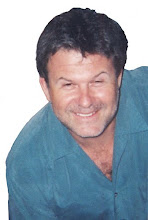By ROBERT PRICE
The kids have orders not to touch the 17 cents sitting in the center console of Nigel Oliver’s Chevy Blazer. Not that a kid can do much with 17 cents, but that’s beside the point.
Those two nickels and seven pennies represent a man’s gratitude, a man's pride. That pocket change signifies a stranger's stubborn reluctance to accept insult and defeat as part of some universal, irrevocable reality.
Nigel Oliver wants to hear those coins rattle around near his ashtray for a while longer. It'll remind him of a 101-degree day, a cup of ice and a walking, talking parable with a three-day beard.
It happened last week on a sweltering day in Bakersfield. It must have been around noon when a car pulled off the freeway south of Bakersfield and a 50-ish man with salt-and-pepper hair and a blue baseball cap, short and wiry, scrambled out from the passenger seat onto the dirt shoulder.
He extracted his bags, which were attached to an aluminum luggage cart, and thanked the man who'd driven him up from Los Angeles.
Then he set out for town. It was a long, miserable trudge up Union Avenue, and by the time he reached a bustling roadside mini-market, he must have been about ready to evaporate in his work boots.
He staggered into the convenience store, filled his insulated, 32-ounce coffee cup from the ice machine and stepped to the back of the line. When he reached the front, the clerk looked him over. “Eighty-nine cents,” he said.
The salt-and-pepper man didn’t need to rummage through his pockets. He hadn't expected a cup of ice to cost quite so much, and he knew he didn’t have it. Realizing this, the clerk took the man's cup, walked over to a sink and poured the ice down the drain.
Perhaps accustomed to such humiliations, the salt-and-pepper man walked back out through the double glass doors and calmly sat down on a curb. He took out an old, mottled rag and wiped off his sweaty arms and forehead.
That’s what he was doing when Oliver, who’d stopped there to gas up his ’85 SUV, found him. Oliver had watched the whole thing unfold inside the store, and after he’d paid for his gas and his Gatorade, he walked over to the man.
Did he need anything? A Coke? No thanks. A beer? The man hadn't had a drink in 11 years, and he wasn't about to start again now. In fact, the stranger said, he was just fine. Oliver went back into the store anyway and filled his own 64-ounce plastic mug with ice. After some prodding, the man accepted it.
Oliver asked him his name. Charles, the man answered, but friends called him Charley. You, Charley said, can call me Charley.
Oliver asked him where he was headed. Charley wasn’t sure. Probably into town, he said. He could get a meal and a break from the heat at the Bakersfield Homeless Center, Oliver said. Could he use a little bus fare to get himself there? No thanks, Charley responded. He could walk. You'll fry first, Oliver said. It's a mighty long walk, and today's a mighty hot day.
Charley thought this over for a minute. He had a couple of dollars in food stamps he could pay in exchange for a ride, he said. Hop in, said Oliver, but don't worry about the food stamps. Oliver tossed in Charley's luggage cart, with its small suitcase, backpack and shaving kit, and they drove away.
It was only after he’d delivered his passenger to the Bethany Center and then driven a few blocks toward home that Oliver noticed the coins resting on the little tray of his vehicle's center console — 17 cents that hadn't been there before. Seventeen cents that might have represented all the money Charley had at the time.
When he talks about the incident now, Oliver is alternately sad and irate. He thinks about the cup of ice that went down the drain and how much good it might have done.
“How can you deny a man a cup of ice?” asks Oliver, who works overnight shifts as a pumper for a Kern County oil refinery. “In the city that started the Random Acts of Kindness thing, that's pretty bad.”
There's more than one irony at work here, though: The mini-market chain that turned away the overheated stranger — undoubtedly to discourage loitering and avoid the stray-cat syndrome that plagues many Union Avenue businesses — is a regular contributor to at least one homeless program in Bakersfield.
These are programs designed to take homeless and destitute people — vagrants, hobos, mentally ill, whatever they might be —out of settings like the one at the convenience store and place them in environments where they can get both immediate and long-range sustenance.
At the Bakersfield Rescue Mission, “clients” can work toward their GED, or high-school equivalency diploma. At the Bakersfield Homeless Center, operated by Bethany Services, they can work part-time feeding and housing their Colleagues. The idea is to pass out confidence along with corned-beef hash, self-esteem, blankets and pillows.
If a homeless man walks out into the world each morning with a full belly, good. If he walks out with more pride in himself, with a greater resolve, than when he checked in, even better.
It's that very principle, though, that gives Nigel Oliver pause when he reflects on Charley and his 17 cents. Charley, he believes, already possesses a healthy measure of pride and resolve. He's got some self-esteem, Some integrity, some dignity.
All he wanted was a cup of ice.
Published Aug. 6, 2000
Tuesday, April 21, 2009
Subscribe to:
Post Comments (Atom)

No comments:
Post a Comment